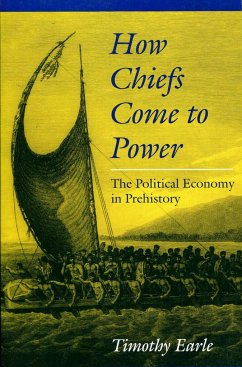"This concise and elegantly written book examines how chiefs develop and maintain political power in prestate complex societies, or what anthropologists commonly refer to as chiefdoms. . . . [It] is path-breaking in its sophisticated dissection of the relationship between ideology and other sources of power that narrows the gap between cultural evolutionary, Marxist, symbolic, and human agency theories of complex society development."--The Annals of the American Academy of Political & Social Sciences "In the present volume, Earle weaves together variation and pattern to bring us the very best of anthropology. . . . [Earle's] latest work is a powerful synthesis of theory and data that leaves us with both a better understanding of the political economy of chiefdoms and a solid foundation for future research into critical questions about the origins and maintenance of centralized polities and systems of social control."--American Anthropologist
Hinweis: Dieser Artikel kann nur an eine deutsche Lieferadresse ausgeliefert werden.
Hinweis: Dieser Artikel kann nur an eine deutsche Lieferadresse ausgeliefert werden.








